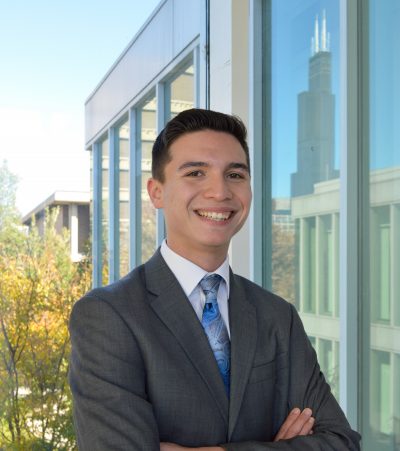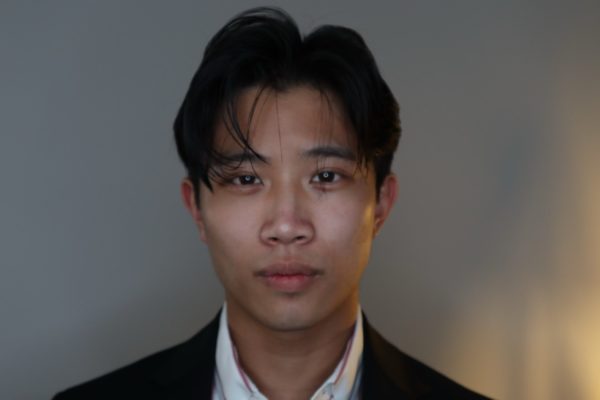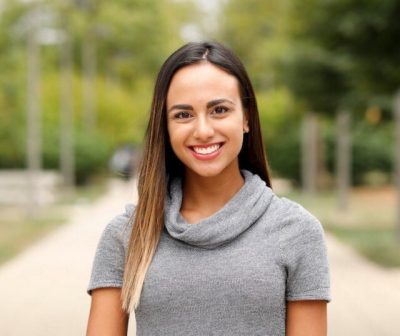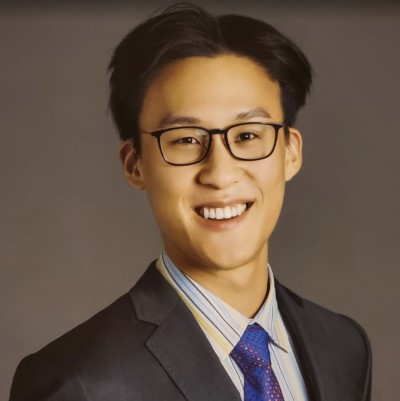GPPA Students
For Current Students Heading link
Meet Our Alumni Heading link
-
Corazon Avila, Third Year

Applying for the GPPA Medical Scholars Program is one of the best decisions I made because it has shaped my professional and leadership development, as well as provided me with the necessary knowledge and skills needed to understand and appreciate medicine as an art and science. As a current Junior in the program, I am involved in the Medical Scholars Advisory Council (MSAC) as one of the student representatives for my class. My role is to serve as a liaison between the students and administration to relay information, concerns, and ideas to help improve the program. One of my favorite aspects of being part of MSAC is interacting with prospective students interested in the program and hosting informational events and Q&A sessions to encourage students to apply and choose to become a GPPA Medical Scholar.
Outside of my responsibilities as a member of MSAC, I am involved on campus as Vice President of the Medical Social Equity Initiative (MSEI), a club dedicated to understanding and raising awareness about the intersectionality between social equity causes, the health field, and medical policies. My interest in understanding health inequities stemmed from conducting research at the UIC School of Public Health investigating breast cancer health equity among Latinx populations in Chicago. Having this research experience early on was the pinnacle to helping me understand the influence of social inequalities on the health of populations, especially in cancer disparities. It is also what drew my interest in women’s health and reproductive rights advocacy.
Part of being a GPPA Medical Scholar involves being socially participatory in advocating for healthcare access and human rights. I am currently part of the Community Advisory Board for Illinois Contraceptive Access Now (ICAN), a nonprofit organization focused on expanding access to contraception and supporting reproductive rights in Illinois. Due to the pandemic, many youth did not receive comprehensive and confidential sexual and reproductive health education, especially those identifying as Latinx, undocumented, Spanish-speaking, and/or uninsured. As a member of ICAN, I developed a curriculum aimed at educating Latinx youth about sexual and reproductive health, healthcare rights, and debunking cultural stigmas. I implemented this curriculum at the Mimedico Clinic, which is located in the Pilsen neighborhood of Chicago. Moving forward, I will continue to teach my curriculum not only to patients in the clinic, but to the surrounding community. Additionally, I hope to develop more classes that aim to empower populations that experience disproportionate health outcomes to understand and utilize their rights to healthcare services.
Since UIC is located in the center of the city, there are so many opportunities available to GPPA Medical Scholars students. We can make impactful differences in nearby communities that encounter many systemic barriers to healthcare. Through these experiences, I learned the importance of patient education and its effects on health outcomes. As a future physician, I will strive to continue educating populations about their rights to accessing healthcare and raising awareness among my peers about the barriers that exist. Practicing medicine is more than just understanding the complexities of disease, it is also having awareness of the factors that contribute to inequitable health outcomes and actively working to promote health equity in populations that have been systematically oppressed.
-
Michael Martinez, BS ‘19

The GPPA Medical Scholars Program challenges students to explore the art and science of medicine early on in their undergraduate career, allowing students to truly explore their passions in medicine. I am currently taking a gap year, working in a molecular biology lab here at UIC! I am pursuing this gap year to strengthen my understanding of immunobiology, as well as to gain familiarity with lab techniques which underscore the basic sciences.
My most meaningful leadership position at UIC was serving as the founder/president of the UIC Speech Team. Competitive public speaking involves students traveling to universities across the nation to give speeches on topics which they are passionate about. Similar to gymnastics, there are multiple speaking and acting categories one can compete in, such as persuasive speaking or prose interpretation. As a new team, we had no funding, but our competitors boasted annual budgets near $250,000. With such a significant resource disparity between us and other programs, our only chance at succeeding was working as a team. 12 talented and proven leaders from UIC (including some fellow GPPA Medical Scholars) were selected to join the team. We practiced 10 hours per week, fundraised, and worked part time jobs to afford competing in over 20 regular season tournaments. Lacking coaches, we learned from critiquing one another. In our first year, UIC placed 22nd out of the nearly 100 teams at nationals. The following year, we secured funding for three coaches, propelling us to a 9th place finish at nationals. We were one of the fastest teams in history to place in the top 10. Impressed with these efforts, UIC awarded the UIC Speech Team $60,000 annually to maintain being one of the best teams in the nation.
GPPA taught me how to discuss and challenge set principles. Dr. Chambers and Dr. Cohen pushed us to think about the “non-scientific” competencies which help physicians thrive. We had a conversation surrounding how physicians who were knowledgeable in philosophy and politics, or physicians who enjoyed literature and history, were equipped to be strong patient advocates. This moment helped me understand that being a physician not only requires a strong understanding of the sciences, but it also requires being a well-rounded human as well. GPPA Medicine was my first opportunity to discuss patient cases within these realms, analyzing readings where physicians had to balance the tenets of doing no harm, alleviating suffering, and preserving patient autonomy. I am excited to carry these insights with me as I prepare to begin medical school, utilizing them will help me understand the art and science of medicine.
-
David Wu, BS ’21

A pre-medical education in university is pre-professional, but it is also pre-life.” This lesson is one of the first we learn as GPPA medical scholars in our core curriculum, and I feel that no quote better encapsulates my experience in the GPPA Medical Scholars Program (MSP) here at UIC.
As a child, I longed to be a physician. I even dressed up for Halloween one year as a doctor in one of my dad’s old white coats. While at the time, that coat came down to the floor, when I looked in the mirror, I could clearly imagine myself with a stethoscope around my neck, and I dreamed about the day that I would one day receive a white coat of my own.
As I grew older and it finally came time to apply to colleges, it became important to me to pick a program that would empower me to achieve my goals. While I had witnessed the ups and downs of medicine firsthand through a family of physicians, I still yearned for a deeper understanding of the field I wanted to enter. I was seeking a program that would inform me in this regard while giving me the freedom to explore my passions. After careful consideration, I ultimately chose the GPPA MSP, and I couldn’t be more enthusiastic about that decision.
With its guaranteed seat, the GPPA MSP enabled me to expand on my interests en route to a life in medicine. I strongly believe that a great physician must also be a great humanist. With the encouragement of Dr. Chambers, I was emboldened to pursue a longtime interest of mine, philosophy.
In analytical philosophy, we are constantly asked to consider what ways a school of thought might be flawed, revisit our biases, and look for perspectives that are being ignored. Thanks to my years immersed in the discipline, I’ve begun to see philosophy all around me. The recent COVID-19 pandemic, for one, has illustrated to us that our country is still fighting to provide equitable access to resources. At a time like this, what obligation does a country have to ensure its peoples’ health? What role should physicians play given their social contract? On precisely what grounds is access to healthcare a moral issue? The importance of medicine in society is growing, not shrinking, and I was struck by the revelation that I lacked the skills necessary to respond in kind.In the months following the pandemic’s inception, I personally led the founding of two clubs: Lil Homies, Big Homies (LHBH) and Hearts for the Homeless International (H4H), UIC Chapter. LHBH aims to serve the Rockford Public School district through mentorship and tutoring with children in classrooms affected by a statewide disparity in education. On the other hand, H4H is an international organization which provides free heart health education events and services for the homeless populations of over 30 cities worldwide. I’m currently collaborating with many of my fellow medical scholars in these organizations and others in our goal to shape the future of healthcare delivery.
Experiences like these in and outside of the classroom have reinforced my position that physicians are called to be community leaders for the public good. As a member of the first Medical Scholars Advisory Council (MSAC), the MSP gave me a platform to work alongside the administration to advocate for the needs of my classmates in the betterment of the program. We meet monthly to discuss salient issues, plan upcoming events, and work on our annual publication, The Continuum. I consistently admire the way the Medical Scholars Program actively incorporates its student body into its decision making processes and continually reevaluates how it can facilitate each students’ successes.
Lastly, I would be remiss if I did not mention the growth I’ve experienced as a scientist while part of the MSP. The Shukla Lab at the Lions of Illinois Eye Research Institute is a global leader in viral research. So far, I’ve dedicated over 2000 hours to research in our lab with a 20 hour per week minimum commitment. My current project is an inquiry into the use of activated carbon as a drug delivery platform. I am a co-author on our most recent manuscript covering this technology’s application to acyclovir and similar antivirals in vitro and in vivo and have co-authored another of our recently submitted manuscripts. Lately, I have been working to expand the range of this technology’s capabilities and have just characterized our patented carbon for the corticosteroid dexamethasone in loading and release. My maturation as a scientist hasn’t been an easy journey. Basic science research results are not guaranteed to manifest, and I’ve spent many late nights in the lab desperately trying to replicate my results to no avail. However, the satisfaction of the fruits, the lab’s collective energy, and the hunger for knowledge keeps me returning for more.
I credit the GPPA MSP for facilitating me in my endeavors throughout undergrad. I’m extremely grateful for the opportunity to have worked with such an amazing community. I’ve experienced tremendous growth as a scholar, a leader, a scientist, and most importantly, as a person. At the threshold between university and medical school, I’m eagerly anticipating the next steps in my medical journey, but I look back on my years in the Medical Scholars Program with a deep sense of appreciation for its central role in my pre-professional–and pre-life–development.
-
Maya Patel, BS ’19

The GPPA Medical Scholars Program has offered me so many opportunities that I couldn’t have had otherwise, which ultimately helped me become more mature and well-rounded. During undergrad, I joined a sorority, which allowed me to cultivate my leadership skills through the various director/executive board positions I held each year. And, the curriculum introduced me to topics in medicine that I would not have been exposed to otherwise. I feel more confident than ever in my ability to be a great physician.
Currently, I am pursuing a masters in Medical Anthropolgy from the University of Oxford. With this program, I hope to learn about the massive role culture has in how medicine is practiced. Medical practice is directed by physician judgement, which is shaped by one’s culture. I believe that this program will allow me to become more culturally competent, and will help me to better evaluate both my own American cultures’ influence in my medical beliefs. Together, I will leave this course with a better understanding of, to quote from a GPPA course, “the scope of medicine”.
I’m taking a gap year because medicine is not just a career, it’s a lifestyle and a commitment to society. That’s a huge responsibility, and I want to make sure that I’m ready for it. Taking a gap year will allow me to have a deeper understanding of myself and of the world, and will result in me feeling prepared to take care of others.
Ultimately, GPPA has refined my critical thinking skills, and has challenged me to ask questions about everything. This is a skill crucial for physicians, who are constantly analyzing patients, research, test results, and more. My gap year will help me to better appreciate what medicine is and how culture influences medicine, which will allow me to be a better physician as well.
-
Albert Yen, Senior, Major: Mathematics and Computer Science

Going into college, I knew I wanted to pursue medicine, but at the same time I was equally sure that I did not want to major in biology as a premed. My academic interests span wide, covering everything from the social sciences, math, and public policy. I ultimately decided on being a math and computer science major, hoping to leverage the advent of computation and big data in medicine. I often had to explain to people back home why I do not major in something “medical”. However, as Dr. Chambers always says, every discipline relates to medicine, whether directly or indirectly. In the GPPA Medical Scholars program, there is no standard track that everyone needs to conform to. My somewhat unusual interests are welcomed as contributing to the intellectual diversity of the community, and I find a sense of belonging in the program, both socially and academically.
As a medical scholar, I feel comfortable in my own skin while always striving to improve myself. My worldview is constantly expanding from listening to the words of the faculty and my peers. During my freshman year meeting with Dr. Chambers, he introduced me to computational biology, a field with heavy overlap between biology, math, and computer science. I did not know how to dig deeper into the subject at the time, but it opened my eyes to a range of opportunities that I never considered.
Eventually, I got a chance to work on a single cell RNA sequencing project during my summer research internship, and I greatly enjoyed the experience of computational research. The interdisciplinary nature of computational research that integrates statistics to analyze and visualize the data, computer science to conduct the research, and biology to formulate the research question, fascinates me. This summer I interned in the Harvard Summer Institute of Biomedical Informatics, where I learned more about big data research and applying machine learning in medical problems. Through the Medical Scholars Program, I have honed my raw inclination towards math and computer science into a concrete endeavor. After graduation, I plan to pursue a MD/PhD degree in bioinformatics, building upon my current interest in computational research in medicine.Beyond academics, I have also continued to pursue my personal passions throughout my time at UIC. I have been a Go player for 16 years, and the self advocacy skills I have developed as a Medical Scholar has greatly enhanced my involvement in the Go community. Earlier this year, I published my first Go publication in print on Amazon Books, titled Overcoming Human Igo. The book is a game commentary series on my eight matches during the 2019 World Amateur Go Championship (WAGC), where I placed fourth and tied the second best American finish ever. It is the first English Go book that fully integrates artificial intelligence (AI) analysis with game reviews, and I also included comprehensive explanations on how to interpret AI analysis using human intuitions. Computer programs have only surpassed humans within the past few years, so I am very excited to share new AI-derived insights with my readers. Even in my non-academic pursuits, I have received tremendous support from the Medical Scholars community. It was through conversations with Dr. Chambers and my peers that I started to see I have something to offer to the Go community besides being a competitor. Every step of the way, my peers celebrated my achievements and encouraged me to push a little further, helping me evolve from a competitor to a published Go author. While the pandemic has introduced many novel challenges in our lives, it has made me confident that I have made some lifelong friends at UIC.